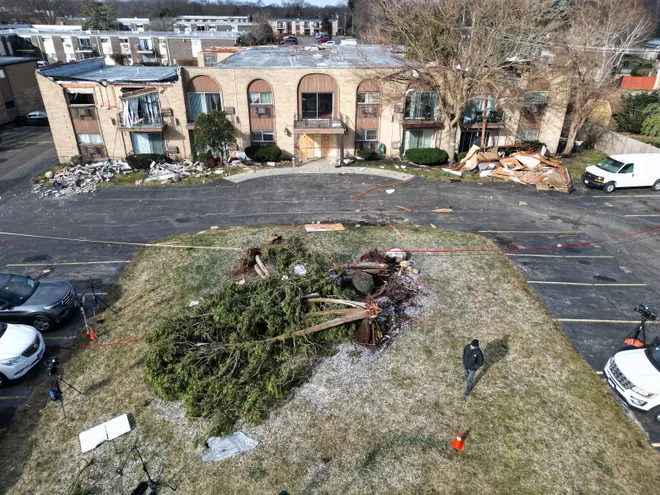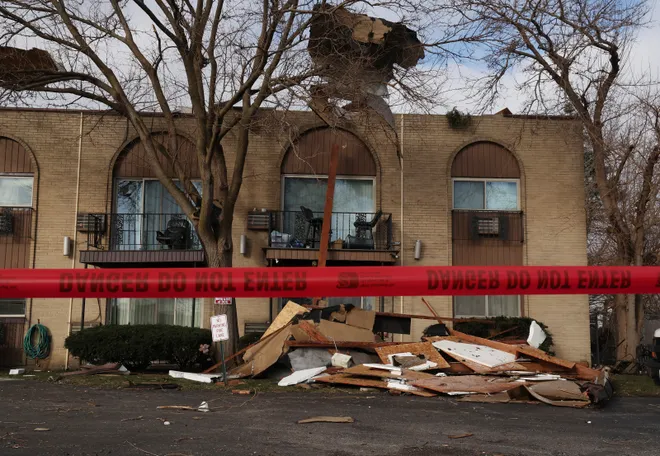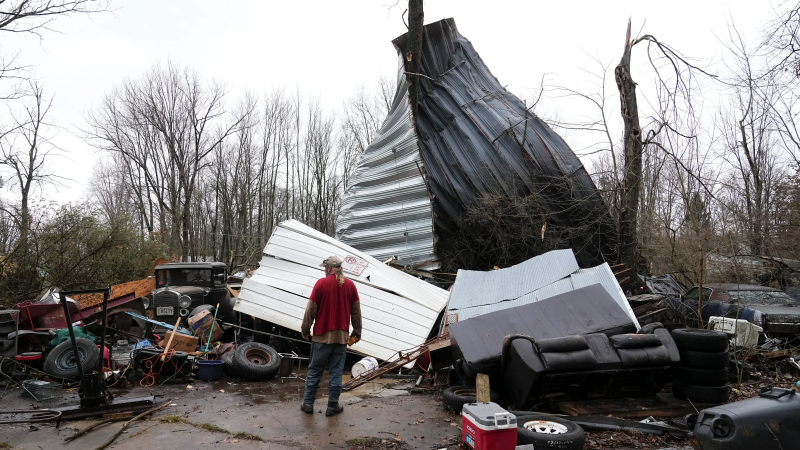Wind advisories grip the Midwest as storms move east after overnight tornado warnings

Wind advisories were issued for parts of the Midwest and the Ohio Valley on Wednesday morning after the area faced overnight tornado warnings as the National Weather Service investigated reports of tornadoes in northwest Illinois and some suburbs of Chicago.
Wind advisories were issued on Wednesday morning for a wide swath of the Midwest, including parts of Ohio, western Pennsylvania, and the northern panhandle of West Virginia, as a winter storm moved eastward after dumping hail and rain overnight. Other areas on the East Coast, including Maryland, Virginia, and the Washington area, braced for strong wind gusts on Wednesday afternoon.
More than 46 million people were at risk of damaging thunderstorm winds or wind gusts of 50 knots or higher as of Wednesday afternoon, according to NOAA's Storm Prediction Center.
In Michigan, forecasters warned that possible rain and thunderstorms could be accompanied by severe wind with winds in Detroit reaching up to 45 mph. It came after the city broke an all-time high temperature record on Tuesday when temperatures reached 72 degrees, 2 degrees above the highest on record for the month of February.
Winds of up to 50 mph and pea-sized hail were possible in Cleveland and the area to its east early Wednesday morning, the National Weather Service said. A hazardous weather outlook was also issued for northeastern parts of the state, with 50 mph gusts of wind expected through 7 p.m. on Wednesday.
Excessive rainfall from the storm threatened to cause flooding through 11 a.m. on Wednesday morning in some parts of Ohio, Pennsylvania, and West Virginia.

Severe weather is also possible along the western slopes of the Appalachians, with threats of heavy winds and hail Wednesday morning, the NWS said.
As the storm stretched towards the East Coast, Baltimore braced for wind gusts of up to 55 mph on Wednesday afternoon and into the evening.
The shifting storm will also bring "possibly damaging winds" of up to 50 mph to the city of New York and its surrounding forecast region into Wednesday night.
Forecasters warned a strong cold front passing over the state could cause "multiple hazards," including possible damaging winds and some showers and thunderstorms in eastern New York and Albany on Wednesday night.
Ahead of the predicted cold blast, temperatures recorded at Buffalo Airport and in Watertown broke record high temperatures for Feb. 27. The same day, Rochester Airport's recorded temperature of 73 degrees tied a past record set in 1997 for the warmest in February.

Overnight tornado warnings throughout Midwest
The wind advisories came after residents of Ohio, Illinois, and Michigan, as well as Kentucky and West Virginia, hunkered down as Tuesday evening brought tornado warnings.
The NWS in Chicago investigated reports of tornadoes that formed from northwest Illinois eastward to the Chicago suburbs on Tuesday. It was likely that at least five tornadoes formed, the Service said.
It's "not too uncommon" to have tornadoes in February, said tornado expert Victor Gensini, an assistant professor at Northern Illinois University.
"But we had tornadoes in similar areas just a few weeks ago," he added. "Couple that with some record-breaking temperatures and folks begin asking questions."
"To me, this is a good example of the new norms associated with climate change," Gensini told USA TODAY on Tuesday night, shortly after a tornado had been confirmed near his home.
Some residents of Indianapolis also woke to the sounds of tornado sirens after the city's NWS issued a tornado warning for an area including Greenwood and Lawrence in the early hours of Wednesday.
The NOAA received preliminary reports of four tornadoes in Illinois, two in Michigan and four in Ohio.
Contributing: Dinah Pulver
Disclaimer: The copyright of this article belongs to the original author. Reposting this article is solely for the purpose of information dissemination and does not constitute any investment advice. If there is any infringement, please contact us immediately. We will make corrections or deletions as necessary. Thank you.






